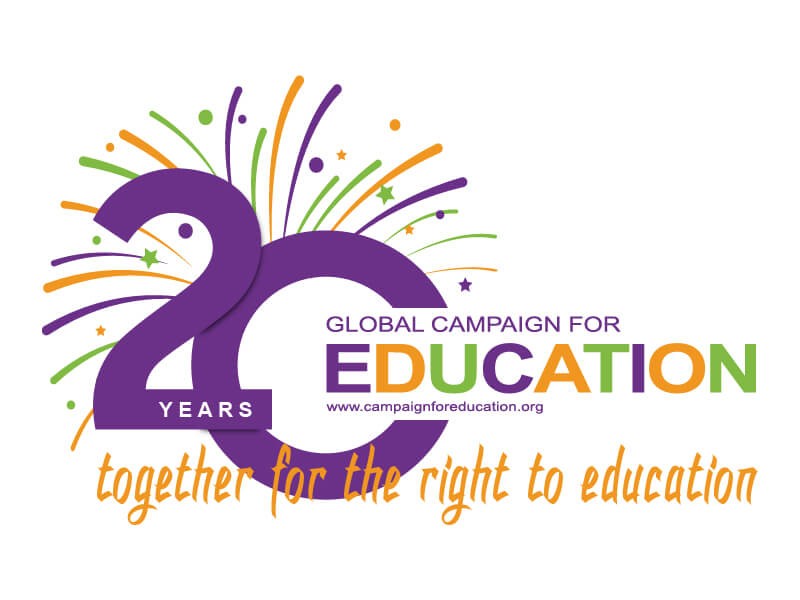2020 International Day Of Education: Education In Emergency Should Be A Global Priority!

For more information and interviews may you contact: philani[a]campaignforeducation.org/+27 11 447 4111
24, January, Johannesburg, South Africa, Across the world access to free, quality, inclusive public education for all is denied to millions of children, youth and adults by displaced by violent conflict, the climate crisis, and natural disasters.
Despite growing calls for increased funding and support for Education in Emergency (EiE), education remains terribly underfunded in crises, accounting for less than 3 percent of total global funding for humanitarian aid.
Students and schools are deeply affected by conflicts and disasters. An estimated 70.8 million people around the world were forced from home by conflict and persecution at the end of 2018. About 17 million of these were children, 30 million being refugees and stateless people who have struggled to access quality education. Among refugees alone, just over half of the children of primary school age attend school, while less than a quarter of the equivalent age group are in secondary school and merely a per cent in tertiary education. The recent examples of the simmering volcanic eruption in Manila forced 73,000 students out of the evacuation zone while 78 schools were closed and the ravaging inferno in the south-east of Australia prompts the assessment of more than 140 schools that were affected by the bushfire.
Efforts by the Economic Community of West African States (ECOWAS) tasking member states to allocate resources from specific budgetary provisions to promote education accessibility and inclusiveness of Persons with Disabilities (PWDs), Internally Displaced Persons (IDPs), refugees, returnees and stateless persons are a step in the right direction, and governments, regional bodies, and institutions are encouraged to emulate and truly commit to mobilise domestic resources to fund education including the most marginalised.
Refat Sabbah, GCE’s President and lifelong activist for the right to education in Palestine is confronted with the issue on a daily basis. “In Palestine, we live with the issue of displacement and restriction to the freedom of movement every day. Despite the short distance, students often have to walk a long way to reach their school, to avoid checkpoints and road closures, with the hope that schools will be open. A reality that has psychological, social and behavioral effects on learners and teachers alike.”
The Global Campaign for Education calls on governments and the international community to develop and implement comprehensive frameworks to secure the right to high quality education for internally displaced people, asylum seekers and refugees all across the world. Only by designing, implementing and securing sufficient funding to address education needs in contexts of emergency, including the reconstruction of school facilities, and the adaptation of schools and the entire education systems to respond to the specific needs of displaced people, we can secure that displaced people are not left behind.
For Education Day, education in emergency and for displaced populations should be a global priority!
Notes to editors:
- GCE is a leading civil society movement that promotes and defends education as a fundamental human right. GCE has over 119 members, 90 of these are national education coalitions, 16 International NGOs and 13 regional networks and youth-led organisation. GCE advocates for education as a basic right. GCE defines education as the foundation for all forms of development and as a catalyst for growth. As a transnational organisation GCE believes that education is the key to ensuring sustainable and equitable economic growth, improved health and social development
- GCE Statement for Education Day is available here
- GCE members will carry out various activities on International Day of Education as following:
- Halley Movement Coalition (Mauritius) will hold an Education Awareness Workshop,
- Coalition Education (France) issued this paper on education in Sahel countries,
- Humanity & Inclusion, will run a social media and media advocacy campaign on children living with disabilities,
- Educaid (Belgium), will run a social media campaign on SDG4 and Education Day,
- Campaign for Popular Education, CAMPE, (Bangladesh) will run an Education Day in-house discussion, publish article of EiE, and media engagement.
- CBM International will publish article on EiE,
- Zambia National Education Coalition, ZANEC, (ZAMBIA), will run media and social media campaigns on Education Day,
- Colectivo de Educacion para todas y todos de Guatemala, is issuing out a media statement and engaging with the media,
- Coalition des Organisations Mauritaniennes pour l’Education, COMEDUC, (Mauritanie), will hold an education training and child protection awareness session,
- Coalition Nationale Malgache pour l’Education pour Tous, CONAMEPT, (Madagascar) will organise a press conference,
- Puntland Network on Education for All, will hold a debate on education, and learning and exchange session.
Contact us for more information.


